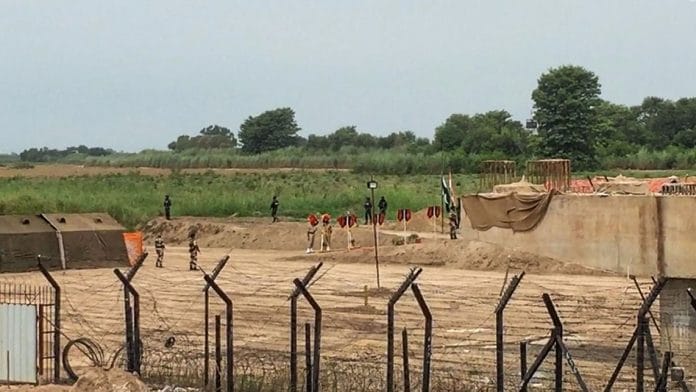New Delhi: Pakistan’s insistence on levying a service charge on those wishing to travel across the Kartarpur Sahib Corridor has stalled the signing of an agreement with India.
The two sides have agreed on visa-free travel of Indian pilgrims to the Kartarpur Sahib Gurudwara without any restrictions, based on their faith. India and Pakistan have also agreed that 5,000 Indian pilgrims can visit the final resting place of Sikhism founder Guru Nanak every day.
Indian and Pakistani officials met for talks at Attari Wednesday morning, with Pakistan refusing to allow consular and protocol officials to accompany pilgrims.
A draft agreement on operationalising the corridor by November, to commemorate the 550th birth anniversary of Guru Nanak, was supposed to be signed by Indian home ministry official S.C.L. Das and Mohammed Faisal, Pakistan’s spokesman who is also responsible for South Asian affairs.
On course despite worsening relations
The talks were on course despite the deteriorating relationship around the Kashmir issue. Pakistan Prime Minister Imran Khan has ordered his diplomats to attempt an internationalisation of the Kashmir issue at every forum, besides leading nationwide protests and demonstrations marking #KashmirHour across the country last week.
But despite all the noise, including around independent consular access given to Kulbhushan Jadhav Monday, the Kartarpar Sahib talks were on course.
Certainly, differences on Kashmir would have broken the Punjab-Punjab spirit that has kept the people-to-people relationship going these past several decades, despite the fact that most of the bloodletting during Partition happened in Punjab.
But Indian officials were also concerned that Khalistani separatist elements might infiltrate the batches of pilgrims at the behest of Pakistani intelligence agencies, and sought to neutralise that by insisting that “protocol and consular officials” accompany Indian pilgrims to Kartarpur Sahib.
Also read: Pakistani engineering near Kartarpur Corridor could cause floods, threaten pilgrim safety
What broke the camel’s back
The straw that seemed to have broken the camel’s back, at least for the moment, was the Pakistani insistence that every Indian pilgrim be charged a fee, which Delhi said “went against the spirit” of Kartarpur Sahib.
It was decided that 5,000 pilgrims of any faith, as well as those carrying Overseas Citizen of India cards, would be allowed to travel across the corridor on a daily basis, and subject to Pakistani capacity, additional numbers would also be allowed on special occasions.
The corridor would be operational throughout the year, seven days a week. It would be up to the pilgrims to choose how they wanted to travel — individually or in groups.
Both countries had agreed to build a bridge over the Ravi at Budhi channel, which separates India and Pakistan. And while the bridge was being constructed on the Pakistani side, a crossing would be identified by both sides.
On the Indian side, a state-of-the-art building to hold as many as 15,000 pilgrims is already being built, and is expected to be ready by October-end, in time for the beginning of the celebrations in honour of Guru Nanak. The four-lane highway connecting Dera Baba Nanak to the highway will be completed by end of this month.
It is remarkable that in the space of less than a year, both sides have raced against time to allow Indians pilgrims to cross the iron curtain that is the Pakistani border. On the Indian side, the BJP realised that this would be a major tool in bringing back the Sikhs to the Akali Dal-BJP fold, which they abandoned in favour of the Congress and Amarinder Singh.
On the Pakistani side, none other than army chief Gen. Qamar Javed Bajwa gave his blessings to the corridor along with Imran Khan last November. It was an invitation Delhi could not refuse, so cabinet minister Harsimrat Kaur and MoS urban development Hardeep Singh Puri led the Indian delegation for the foundation stone-laying ceremony in Pakistan.
Also read: Despite tense ties with India, committed to complete Kartarpur Corridor: Pakistan







Kartapur is a honor for Pakistan……Punjabis on both sides have suffered most because of India Pakistan hostility …………If Punjabis were allowed to resolve then Punjabis could even solve the Kashmir dispute……fees adjustment are minor issue…Modi Govt should not put roadblocks !!!
A lot has changed after the kidnapping of sikh girl and her conversion. Please keep your punjabi nonsense with you.
Punjabis who can’t live together are going to solve Kashmir. First let Punjabis learn to live in peace with their own Punjabi brethren. Kashmiris will sort themselves out.
People to people relationship, despite the bloodletting of Partition … That could be, dear columnist, because the Punjabis are a large hearted people.
Really and they couldn’t live with each other because of their large hearts. Time to get real. Punjab was divided on religious lines. Where was the large heartedness to prevent the division by accomodating conflicting viewpoints? Why did this large heartedness not prevent large scale killings, loot and destruction during partition? Time to stop propagating myths.